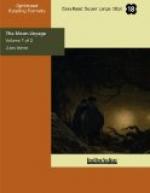“A cannon,” replied Morgan.
“A howitzer,” said the major.
“A mortar,” exclaimed J.T. Maston.
A fresh discussion was pending, each taking the part of his favourite weapon, when the president stopped it short.
“My friends,” said he, “I will soon make you agree. Our Columbiad will be a mixture of all three. It will be a cannon, because the powder-magazine will have the same diameter as the chamber. It will be a howitzer, because it will hurl an obus. Lastly, it will be a mortar, because it will be pointed at an angle of 90 deg., and that without any chance of recoil; unalterably fixed to the ground, it will communicate to the projectile all the power of impulsion accumulated in its body.”
“Adopted, adopted,” answered the members of the committee.
“One question,” said Elphinstone, “and will this canobusomortar be rifled?”
“No,” answered Barbicane. “No, we must have an enormous initial speed, and you know very well that a shot leaves a rifle less rapidly than a smooth-bore.”
“True,” answered the major.
“Well, we have it this time,” repeated J.T. Maston.
“Not quite yet,” replied the president.
“Why not?”
“Because we do not yet know of what metal it will be made.”
“Let us decide that without delay.”
“I was going to propose it to you.”
The four members of the committee each swallowed a dozen sandwiches, followed by a cup of tea, and the debate recommenced.
“Our cannon,” said Barbicane, “must be possessed of great tenacity, great hardness; it must be infusible by heat, indissoluble, and inoxydable by the corrosive action of acids.”
“There is no doubt about that,” answered the major, “and as we shall have to employ a considerable quantity of metal we shall not have much choice.”
“Well, then,” said Morgan, “I propose for the fabrication of the Columbiad the best alloy hitherto known—that is to say, 100 parts of copper, 12 of tin, and 6 of brass.”
“My friends,” answered the president, “I agree that this composition has given excellent results; but in bulk it would be too dear and very hard to work. I therefore think we must adopt an excellent material, but cheap, such as cast-iron. Is not that your opinion, major?”
“Quite,” answered Elphinstone.
“In fact,” resumed Barbicane, “cast-iron costs ten times less than bronze; it is easily melted, it is readily run into sand moulds, and is rapidly manipulated; it is, therefore, an economy of money and time. Besides, that material is excellent, and I remember that during the war at the siege of Atlanta cast-iron cannon fired a thousand shots each every twenty minutes without being damaged by it.”
“Yet cast-iron is very brittle,” answered Morgan.
“Yes, but it possesses resistance too. Besides, we shall not let it explode, I can answer for that.”




